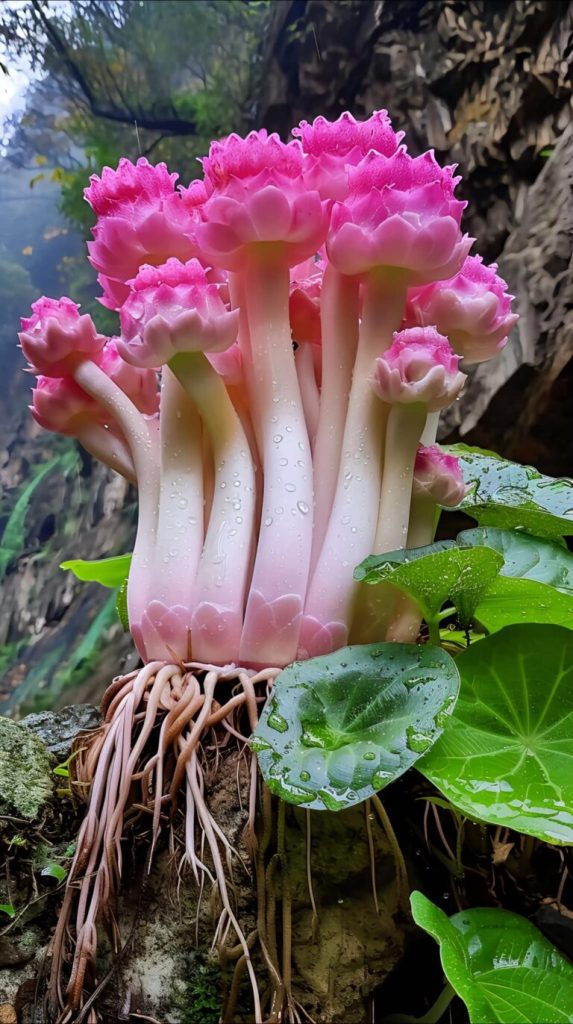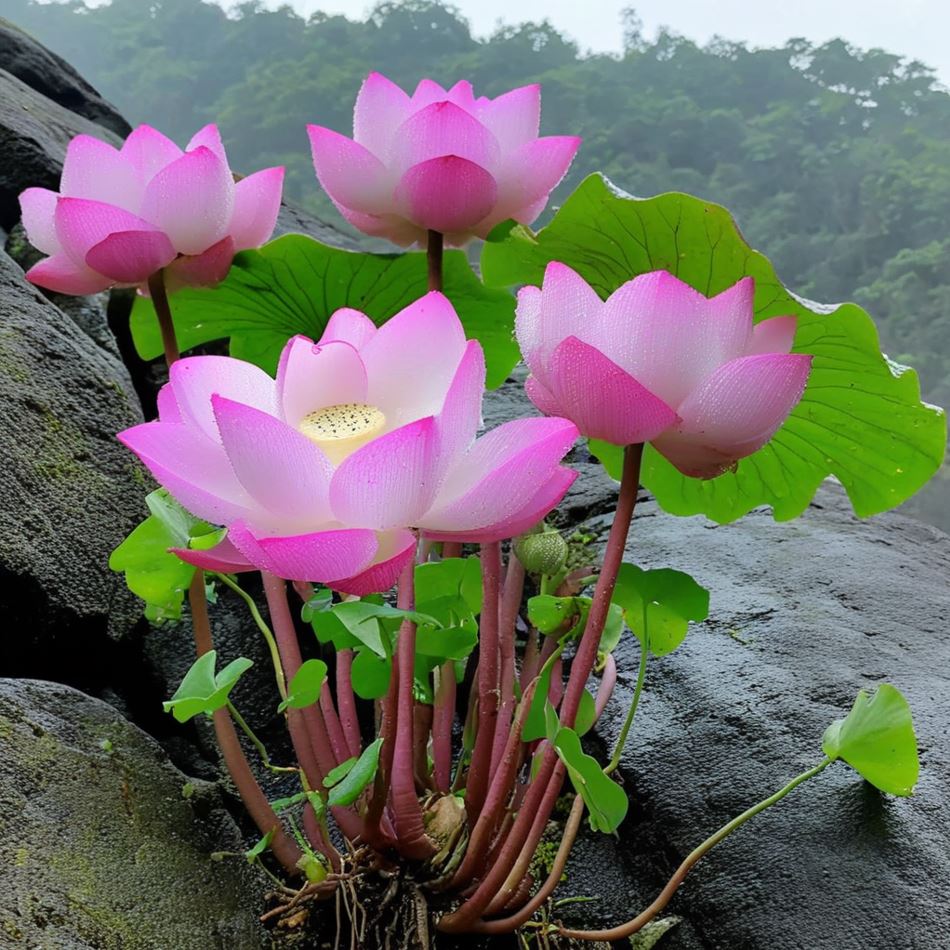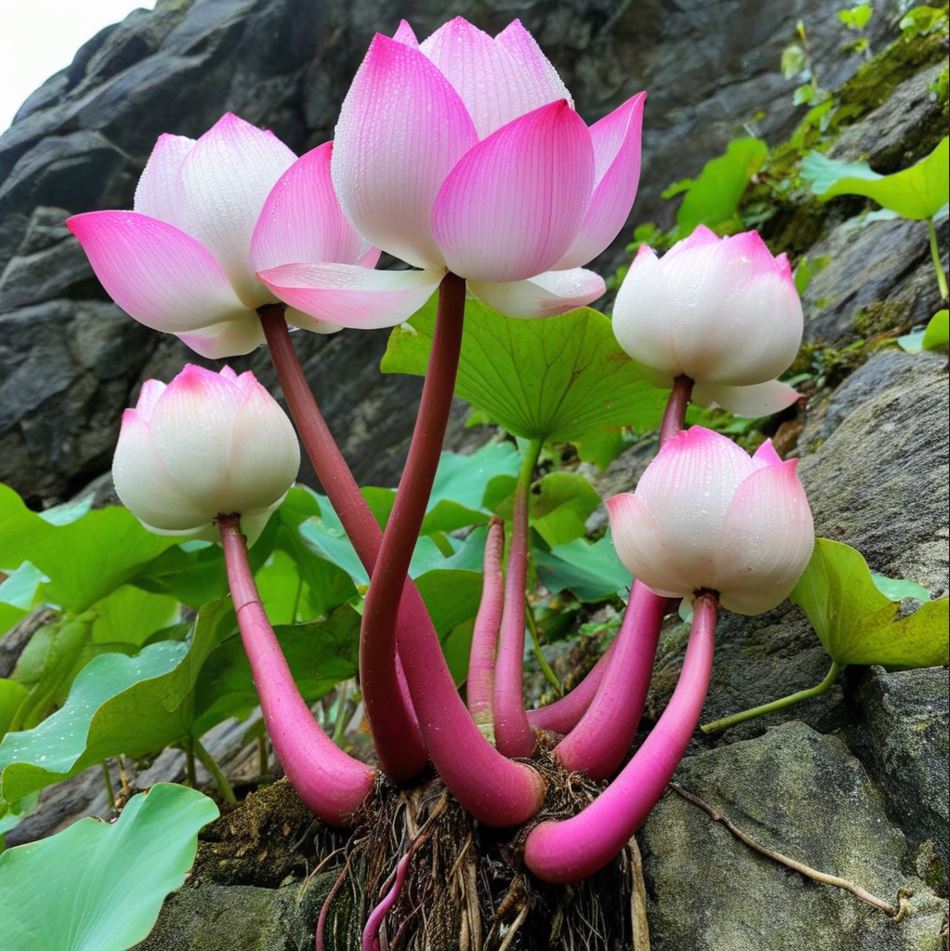The term “rock lotus” conjures visions of a mystical plant that defies the ordinary, nestled in inhospitable terrains yet flourishing with unparalleled beauty. This enchanting organism, particularly the Mystical Rock Lotus, appears to be more than just a botanical curiosity; it embodies themes of resilience, spirituality, and artistic expression. Let’s delve deeper into this extraordinary flower and explore its significance across various domains.

Nature’s Resilience
At its core, the Mystical Rock Lotus presents an inspiring story of survival. It thrives on minimal substrate conditions, often taking root literally on rocks, showcasing nature’s ingenuity in overcoming adversity. Within a temperature range of 60-75°F (16-24°C) and high humidity, this plant symbolizes not only environmental adaptation but also the broader theme of growth amidst challenge. The imagery of delicate white petals emerging from rugged stones evokes parallels to human experiences—where individuals find strength and beauty in their struggles.

Defying the Odds
The Mystical Rock Lotus exemplifies nature’s resilience by flourishing in the most inhospitable conditions. These plants are known to take root directly on rocky surfaces, clinging to the bare minimum of soil and nutrients. This ability to thrive in seemingly barren environments is a testament to the ingenuity of the natural world.
Consider the imagery of a delicate flower blooming from the cracks of a rugged cliff face. This sight serves as a powerful metaphor for the human experience, where individuals overcome adversity and transform their challenges into sources of strength and beauty.
Adaptability and Resourcefulness
The Mystical Rock Lotus has evolved remarkable adaptations to survive in its harsh environments. Its hardy roots can penetrate deep into the crevices of rocks, extracting the necessary moisture and minerals to sustain its growth. The plant’s leaves and petals are designed to withstand intense sunlight and fluctuations in temperature, ensuring its continued flourishing.
This capacity for adaptation resonates with the human experience, where we are often faced with the need to adapt and find creative solutions to overcome obstacles. The rock lotus serves as a reminder that with the right mindset and resourcefulness, we too can thrive in the face of adversity.
Resilience as a Universal Principle
The Mystical Rock Lotus’s ability to persevere in challenging conditions transcends the botanical realm. It represents a universal principle of resilience that can be applied to various aspects of human life, from personal growth to societal challenges.
By studying the rock lotus, we can draw inspiration and insights into how to cultivate our own resilience. Just as the plant defies the odds and flourishes against the odds, we can learn to embrace our own inner strength and emerge stronger from difficult circumstances.
Symbolism in Cultures
Across diverse cultures, the rock lotus has evolved into a powerful symbol of spiritual enlightenment and personal growth. Its journey, from a tiny seed clinging to barren surfaces to a blooming wonder, resonates with many seeking transformation or healing. As the sacred lotus rises from muddy waters, cleansed and pristine, so too can individuals transcend their circumstances, reflecting profound truths about life and spirituality. This representation prompts introspection on how our own ‘roots’ can influence our evolution and contribution to the world.
Spiritual Significance
The rock lotus has long been associated with themes of spiritual enlightenment and personal growth in various cultures. Its ability to thrive in harsh environments is seen as a metaphor for the human capacity to overcome inner challenges and achieve a state of purity and transcendence.
In many Eastern traditions, the lotus flower is revered as a symbol of the divine, representing the journey from the material to the spiritual realm. The rock lotus, with its unique ability to bloom in seemingly inhospitable conditions, is often viewed as a manifestation of this sacred journey.

Cultural Representations
The rock lotus has found its way into the artistic and cultural expressions of diverse civilizations. In Vietnam, for instance, artisans have crafted intricate maps made entirely from succulent or rock lotus, blending nostalgia with creativity. These works emphasize not just the aesthetic appeal of the plant but also its capacity to evoke emotions and connect people through shared cultural symbols.
Imagine an art installation where the rock lotus serves as a bridge, linking past experiences to present realities—a metaphor for the intertwining of history and identity. Such representations allow us to explore the deeper significance of the rock lotus beyond its physical form.
Transformation and Healing
The rock lotus’s symbolic association with transformation and healing resonates across various spiritual and wellness practices. Its journey from a seemingly lifeless seed to a blooming wonder is seen as a metaphor for the human ability to overcome personal challenges and emerge renewed.
In systems like Integrated Energy Therapy (IET), the rock lotus is employed as a symbol to help individuals release emotional blockages and promote balance in their lives. Just as the rock lotus emerges beautifully against all odds, these healing methodologies encourage people to confront their inner struggles and find their own paths to growth and wholeness.
Community and Stewardship
The rock lotus’s cultural significance can also foster a sense of community and environmental stewardship. Collaborative projects that involve planting initiatives or local workshops centered on nurturing these beautiful flowers can bring people together while promoting the care and preservation of our natural surroundings.
Such collective efforts can lead to the creation of community gardens, serving as living testaments to resilience and the importance of caring for our shared ecosystems. By engaging with the rock lotus, individuals and communities can develop a deeper appreciation for the intricate interconnections within nature and their role as stewards of the environment.
Artistic Expressions and Innovations
Beyond its natural beauty, the rock lotus inspires a variety of artistic expressions. For instance, artists in Vietnam have crafted intricate maps made entirely from succulent or rock lotus, blending nostalgia with creativity. Such works emphasize not just the aesthetic appeal of the plant, but also its capacity to evoke emotions and connect people through shared cultural symbols.
Integrating Nature and Art
The rock lotus has become a source of inspiration for artists who seek to integrate the natural world with their creative expressions. By incorporating the plant’s intricate forms, textures, and symbolic meanings into their works, artists are able to create pieces that resonate on multiple levels.
One can imagine an art installation where the rock lotus serves as a central motif, its delicate petals and rugged roots becoming the canvas for a narrative that explores the interplay between humanity and the natural environment. Such works can challenge the viewer to consider the deeper connections between the physical and the metaphysical.
Craftsmanship and Commodification
The allure of the rock lotus has extended into the realm of commerce as well, with artificial versions available for purchase. While these replicas may lack the organic essence of their live counterparts, they offer a means for individuals to incorporate the beauty of the rock lotus into their homes, emphasizing how commodification can transform natural beauty into accessible art forms.
Moreover, platforms like Etsy showcase hand-crafted items inspired by this mythical flower, allowing creators to express their reverence for nature through unique craftsmanship. These products range from decorative sculptures to jewelry and household accessories, each one a testament to the enduring appeal of the rock lotus.
Collaborative Artistic Endeavors
The rock lotus’s symbolic significance has also inspired collaborative artistic projects that bring together diverse communities. Imagine a community-based initiative where local artists, botanists, and gardeners work together to create a public installation featuring the rock lotus.
Such collaborative efforts not only celebrate the plant’s natural beauty but also serve as a platform for exploring its cultural and spiritual resonance. The resulting artwork could take the form of a living garden, a multimedia exhibition, or a series of performative interventions, all of which invite the public to engage with the rock lotus in meaningful and thought-provoking ways.
Bridging the Natural and the Artificial
The commercialization of the rock lotus, through both artificial replicas and handcrafted products, raises intriguing questions about the boundaries between the natural and the artificial. While these manufactured versions may lack the organic essence of the living plant, they still possess a certain allure and allow for the broader dissemination of the rock lotus’s visual and symbolic appeal.
This interplay between the natural and the artificial can be explored further, challenging us to consider the ways in which technology and human ingenuity can both complement and potentially detract from our appreciation of the natural world. The rock lotus, as a symbol of resilience and transformation, can serve as a touchstone for navigating these complex dialogues.
Healing and Wellness
Interestingly, the rock lotus is associated with holistic healing practices. A system known as Integrated Energy Therapy (IET) employs the symbolism of the violet energy ray, aiming to release emotional blockages and promote balance in one’s life. Just as the rock lotus emerges beautifully against all odds, these healing methodologies encourage individuals to confront their inner challenges and emerge stronger. This intersection of nature and wellness illustrates the potential for plants to serve as catalysts for transformative experiences in people’s lives.
Energetic Properties and Symbolism
The rock lotus is believed to possess unique energetic properties that align with holistic healing practices. In systems like Integrated Energy Therapy (IET), the plant’s symbolism is linked to the violet energy ray, which is associated with spiritual awakening, emotional release, and the cultivation of inner harmony.
By meditating on the rock lotus and its ability to thrive in harsh conditions, individuals can be encouraged to confront their own emotional and psychological obstacles. The imagery of the plant’s delicate blooms emerging from the cracks of a rocky surface can serve as a powerful metaphor for personal transformation and the unleashing of one’s true potential.
Therapeutic Applications
The rock lotus’s association with holistic healing extends beyond its symbolic significance. Some practitioners within the realms of aromatherapy, herbal medicine, and flower essences have explored the potential therapeutic benefits of the plant and its extracts.
For instance, rock lotus-infused essential oils or flower essences may be used in complementary therapies to promote relaxation, stress relief, and a heightened sense of inner balance. The plant’s resilience and ability to thrive in adverse conditions are seen as metaphors for the human capacity to overcome personal challenges and achieve a state of greater well-being.
Cultivating Mindfulness and Introspection
The rock lotus’s spiritual and symbolic associations can also be leveraged in mindfulness and introspective practices. By contemplating the plant’s journey from a seemingly lifeless seed to a thriving, beautiful organism, individuals can be encouraged to reflect on their own personal growth and transformation.
Practices such as meditation, journaling, or guided visualization exercises involving the rock lotus can help cultivate a deeper sense of self-awareness, resilience, and connection to the natural world. This integration of the rock lotus into wellness practices highlights the plant’s capacity to serve as a catalyst for personal and spiritual exploration.
Community Engagement and Environmental Stewardship
The rock lotus’s role in healing and wellness extends beyond individual experiences. Communities can rally around the plant as a symbol of unity and environmental stewardship. Collaborative projects that involve planting initiatives or local workshops centered on nurturing these beautiful flowers can foster connections among individuals while promoting the care and preservation of our natural surroundings.
Such collective efforts can lead to the creation of community gardens, serving as living testaments to resilience and the importance of caring for our shared ecosystems. By engaging with the rock lotus, individuals and communities can develop a deeper appreciation for the intricate interconnections within nature and their role as stewards of the environment.
Conclusion
In exploring the concept of the rock lotus, we unearth layers of meaning that go beyond mere biology. From its ability to thrive in harsh conditions to its representation of spiritual journeys and its role in art and wellness, the rock lotus stands as a testament to resilience, creativity, and interconnectedness within the human experience.